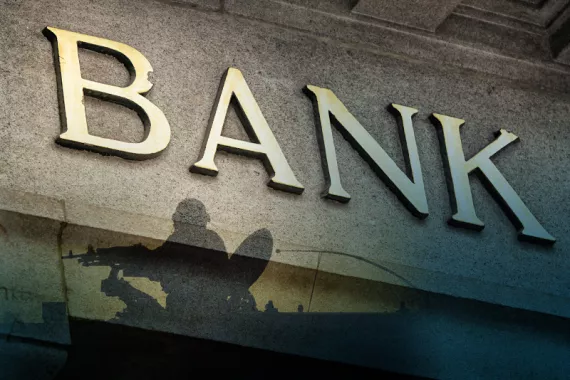The Legal Team
Anti-Terrorism Lawsuit Overview
Without financing or other material support, the architects of terrorism have little to no means of turning violent intentions into actions. This was the passionate belief of our firm’s co-founder, Ron Motley, and it’s a cause we continue to believe in and fight for every day. Motley Rice attorneys help victims and their families seek justice through anti-terrorism lawsuits.
Key takeaways about anti-terrorism lawsuits
- Anti-terrorism lawsuits are legal actions against financiers and material supporters of terrorist attacks as well as the organizations that carry out those attacks.
- Anti-terrorism lawsuits against state sponsors of terrorism are an option for victims who wish to pursue legal action against countries that provide material support for terrorism.
- If you’ve been tragically harmed or someone you love has been tragically harmed or killed by a terrorist act, you may have a legal claim against the responsible parties.
What is an anti-terrorism lawsuit?
Anti-terrorism lawsuits are legal actions taken by people or organizations to hold parties responsible for carrying out or supporting terrorist activities. The goal of these lawsuits is finding justice for victims and their families after these tragic events and bankrupting terrorist organizations to prevent future terrorist attacks. By pursuing anti-terrorism lawsuits, victims and their families may be awarded financial compensation for traumatic events they’ve experienced and injuries they’ve suffered.
Lawyers at Motley Rice have experience navigating many types of anti-terrorism lawsuits.
How terrorism financing lawsuits work
Working closely with victims and families of terrorist attacks, our attorneys use a number of approaches to hold accountable those entities or persons who provide material support to acts of terrorism. These approaches are in part facilitated by the Anti-Terrorism Act (ATA), a law that assures the legal rights of victims to punish terrorists and their financial and material supporters through the U.S. civil justice system.
By depriving terrorist organizations such as Al Qaeda, Hamas, the Liberation Tigers of Tamil Elam, and ISIS of their lifeblood of funding, we can cripple their ability to train, recruit, supply and dispatch terrorist operatives.
This pioneering area of anti-terrorism-related litigation ultimately aims to give the victims their day in court against the individuals and entities that provide material support to terrorism, holding them accountable for their actions.
The civil justice we pursue through these cases provides an important tool in the fight against international terrorism — complementing law enforcement, criminal cases and political efforts.
Anti-terrorism lawsuits against state sponsors
The U.S. Department of State keeps a list of countries identified as having “repeatedly provided support for acts of international terrorism.” This State Sponsors of Terrorism list currently includes Iran, Cuba, the Democratic People’s Republic of Korea (North Korea) and Syria.
Financiers of the terrorist attacks on September 11, 2001
As the September 11, 2001 terrorist attacks touched the lives of all Americans, the Motley Rice anti-terrorism team has taken on groundbreaking legal actions on behalf of many of the survivors and families that lost loved ones on that tragic day.
In the consolidated lawsuit In re: September 11 Litigation (Case No. 21-MC-97-AKH), Motley Rice represented and settled the claims of 56 of the 96 families that opted out of the original September 11th Victim Compensation Fund to pursue claims against aviation and security companies. In addition to providing answers, and compensation to victims’ families, the litigation helped provide public access to evidence in an archive of selected discovery materials gathered during the litigation.
Representing more than 6,600 survivors and family members in multidistrict litigation In re: Terrorist Attacks on September 11, 2001 (Case No. 03-MD-1570-GBD), Motley Rice seeks to hold accountable the financiers of the terrorist attacks. Visit In re: Terrorist Attacks on September 11, 2001, with the 9/11 Families United to Bankrupt Terrorism and our 9/11 Victims Compensation Fund article to read more about our work.
Hamas and Iran
On October 7, 2023, the Hamas terrorist organization carried out a deadly attack in Israel. More than 1,200 people died, thousands suffered injuries and more than 200 civilians were kidnapped. On November 17, 2024, individuals and families filed a lawsuit against the Islamic Republic of Iran. These lawsuits alleged that the Iranian government coordinated and financed the Hamas terrorist attack on Israel.
Since there is substantial information and proof linking Iran to the funding of these terrorist attacks, U.S. law allows for U.S. nationals, U.S. service members and U.S. government contractors to pursue legal action. Victims of the October 7 attacks are suing in the U.S. District Court for the District of Columbia. This lawsuit is designated Case No. 24-cv-3244.
The defendants in this case include:
- Islamic Republic of Iran
- Islamic Revolutionary Guard Corps (IRGC)
- Islamic Revolutionary Guard Corps-Qods Force (IRGC-QF)
- Harakat al-Muqawama al-Islamiya (aka Hamas)
- Palestinian Islamic Jihad
- Hezbollah
- Popular Front for the Liberation of Palestine
Libya and Muammar Qaddafi
Until 2006, Libya was designated by the U.S. Department of State as a State Sponsor of Terrorism for its many acts of international terrorism. In 1988, Libyan government officials ordered the bombing of Pan Am 103 over Lockerbie, Scotland, killing 270 innocent people from all over the world.
Through lawsuits against Libya, our anti-terrorism team continues to represent people injured or killed by terrorist attacks. Motley Rice has litigated cases involving Libya’s support of the Provisional Irish Republican Army (PIRA), the bombing of Berlin’s La Belle Discotheque, and the bombing of Pan Am Flight 103 over Lockerbie, Scotland.
Other anti-terrorism litigation
Another type of anti-terrorism related litigation is aimed at private subsidiary organizations that finance terrorism. This could happen through money laundering or other types of material support intended to advance a terrorist act in some way.
Our attorneys have been involved with this litigation for more than a decade, working through the many layers of the civil justice system to advocate for victims and their families.
Arab Bank
The Arab Bank case was the very first case to bring a financial institution to trial under the Anti-Terrorism Act., Our anti-terrorism team represented nearly 40 U.S. citizens injured in suicide bombings and other attacks carried out by Hamas in Israel and the Palestinian Territories. This included dozens of other American victims of terrorism on foreign soil.
For these victims, we reached a confidential settlement resolving their claims. We also represented thousands of foreign plaintiffs pursuing claims against Arab Bank under the Alien Tort Statute (ATS). The basis for their claims ultimately went before the Supreme Court, which ruled on April 24, 2018, in a 5-4 vote that foreign corporations cannot be sued in U.S. courts under the ATS for human rights violations that occur abroad.
Liberation Tigers of Tamil Elam (LTTE)
This civil litigation concerns the alleged role of Sri Lankan-born American citizen and founder of the hedge fund management firm Galleon Group, Rajakumara "Raj" Rajaratnam, and his father, J.M. Rajaratnamin. They allegedly knew and purposefully provided millions of dollars and other material support to the known terrorist group Liberation Tigers of Tamil Elam (LTTE).
LTTE was founded in 1976 and is located in Sri Lanka and India. Once considered “one of the most dangerous and deadly extremist outfits in the world,” LTTE has carried out no known attacks in Sri Lanka in recent years. However, this group has carried out many terrorist acts throughout its history, resulting in death and serious injuries for thousands of people.
International hotel bombings
Given the heightened risk of attack on western targets in terror-prone regions, western-branded hotels worldwide often fail to take proper security measures to protect their clients following hotel bombing attacks. Motley Rice litigates cases regarding negligent security and premise liability for U.S. citizens harmed in foreign territories on properties owned by U.S.-based entities.
Properties in Afghanistan, Egypt, India, Israel, Jordan and Pakistan have been the sites of international hotel bombings or terrorist attacks. These violent acts have resulted in around 400 deaths and over a thousand injuries.
Our experience handling anti-terrorism lawsuits
Our attorneys have worked for decades to support families and survivors of terrorism on U.S. soil and abroad. Our work is largely facilitated by the Anti-Terrorism Act (ATA), a law that allows U.S. victims to sue terrorists and their financial and material supporters in U.S. federal court.
Motley Rice attorneys have helped victims of various terrorist acts, including:
- Hamas terrorist attacks
- The 9/11 terrorist attacks
- International hotel bombings
- Roadside bombs
Working with an experienced attorney is beneficial. They can understand and navigate the laws surrounding your case, whether through domestic or international legal systems.
Key takeaways
What is an anti-terrorism lawsuit?
Anti-terrorism lawsuits against state sponsors
Other anti-terrorism litigation
Our experience handling anti-terrorism lawsuits
Contact Us
If you think you have a Anti-terrorism claim, consider contacting an attorney to get more information and find out your legal options.
Connect with a LawyerYou can also contact us by calling1.800.768.4026
